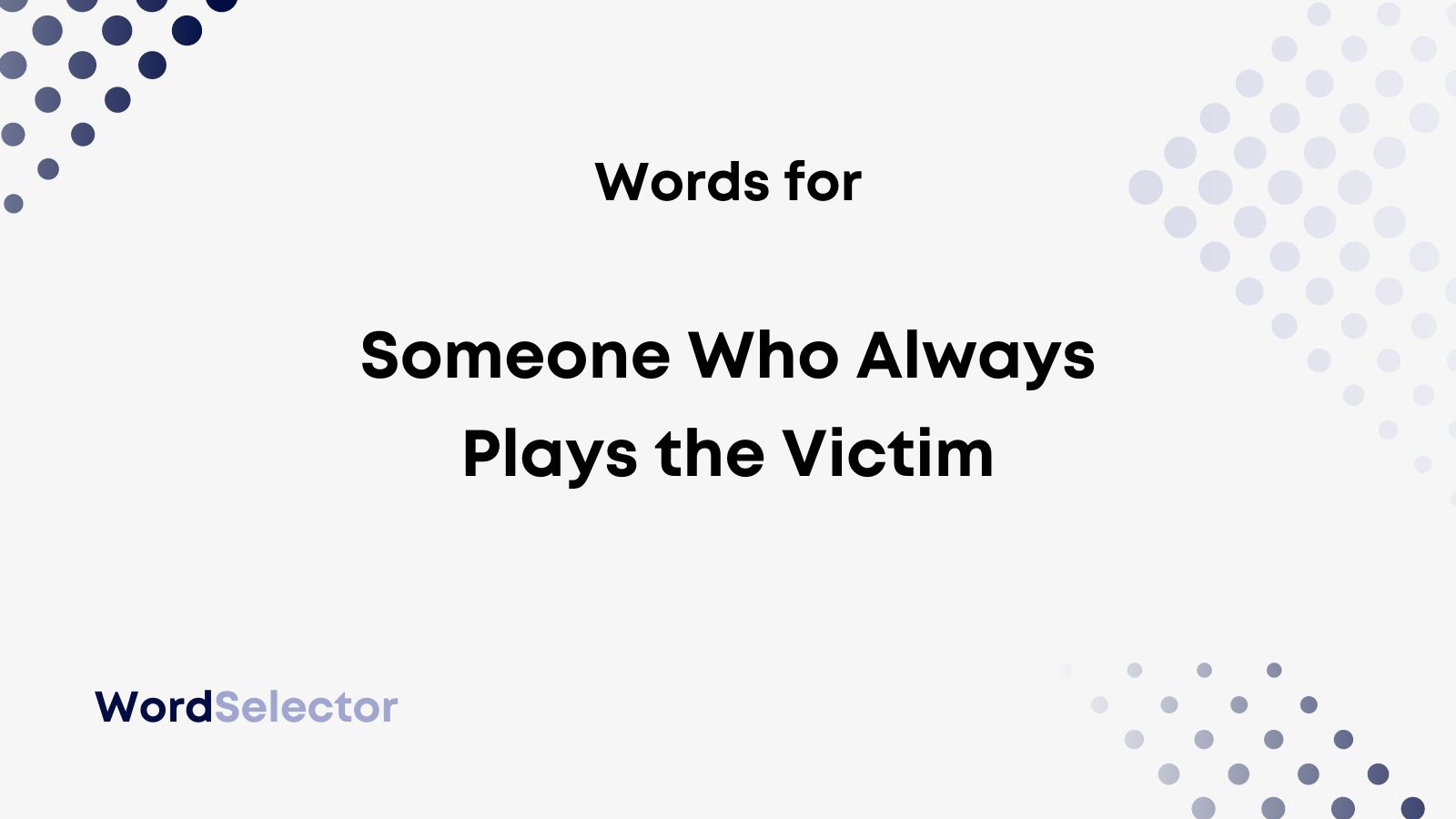It can be very frustrating when someone always acts like the world is against them. So, if you’re wondering how to describe a person who always plays the victim, you’ve come to just the right place.
Below, we’ve compiled a list of useful words and phrases that you can use the next time someone tries to avoid responsibility by acting hard done by.
Words for Someone Who Always Plays the Victim
- Manipulator
- Crybully
- Self-pitying
- Crybaiter
- Coward
- Poor-me
- Professional victim
- Martyr complex
- Persecution complex
- Victim mentality
KEY TAKEAWAYS
- If someone tries to control others by playing the victim, you can call them a “manipulator.”
- A “crybully” is someone who turns the tables on their victim by pretending to be the one getting bullied.
- When someone feels sorry for themselves instead of taking accountability, they are “self-pitying.”
Keep reading to see a more in-depth discussion of each of our chosen terms for someone who always plays the victim.
Moreover, we’ve provided some helpful example sentences below to illustrate how to use these terms.
Manipulator
If you’re looking for one word for a person who always plays the victim, “manipulator” is the best choice.
After all, the phrase “play the victim” implies that the person is consciously trying to convince people that they are the victim in the situation. This is the case even if they are actually the antagonist. They are playing a role, so to speak.
The reason someone might do this is so that the people around them sympathize with them. Therefore, they won’t be held accountable for their contribution to a problem. In other words, it is a method of controlling other people’s behavior.
The Cambridge Dictionary defines a “manipulator” as “a person who controls people to their advantage, often unfairly or dishonestly.”
Therefore, “manipulator” is a perfect word to describe someone who tries to gain sympathy and control other people by pretending to feel victimized.
Calling someone a manipulator is a harsh accusation. However, if you truly believe that their behavior is insincere and manipulative, this phrase would be accurate.
Therefore, let’s see how to use this term in a few example sentences:
Elon is a notorious manipulator, so be wary about taking what he says at face value.
It is ironic that the manipulator of the group always accuses others of being manipulative.
Crybully
According to the Urban Dictionary, a “crybully” is “a bully who harasses their victim, then goes crying fake tears to a person or group of authority or publicity claiming that their victim harassed them in order to encourage them to wrongly persecute the victim as well.”
How very concise!
Nonetheless, this is a good informal term for a person who pretends to be victimized in order to manipulate others and gain sympathy. Moreover, this word carries an additional nuance.
After all, not only does a “crybully” try to get sympathy and attention by playing the victim. They also use this as a tactic to further harass and victimize another person. How insidious!
So, if you ever meet an antagonist who likes to cry crocodile tears when they get caught, you could call them a “crybully.”
Check out the following examples to see this term in action:
Gwaine was always a crybully in school and could switch from villain to victim within seconds – it’s no wonder she became an actor!
If you respond to her taunts, she’ll turn everyone against you – a typical crybully!
Self-pitying
When someone is in the wrong but truly feels as if they are the one being treated unfairly, they may just be “self-pitying.”
Merriam-Webster defines “self-pity” as “a self-indulgent dwelling on one’s own sorrows or misfortunes.” The inclusion of the phrase “self-indulgent” in this definition implies that the person derives some satisfaction from acting like a victim.
This could be because they enjoy the attention they get when people feel sorry for them and offer comfort. Likewise, they may simply like having an excuse to wallow for hours because their life is just so very difficult.
A person may also be “self-pitying” when they have caused a problem and are now forced to face the consequences of their actions. Instead of addressing what they’ve done wrong, they simply feel sorry for themselves because things didn’t go their way.
Therefore, a “self-pitying” person may also be consciously or unconsciously trying to manipulate those around them. That way, they can avoid responsibility.
Have a look at the examples below:
Brenda has taken to being self-pitying instead of just apologizing for her actions.
Stop being so self-pitying and take responsibility!

